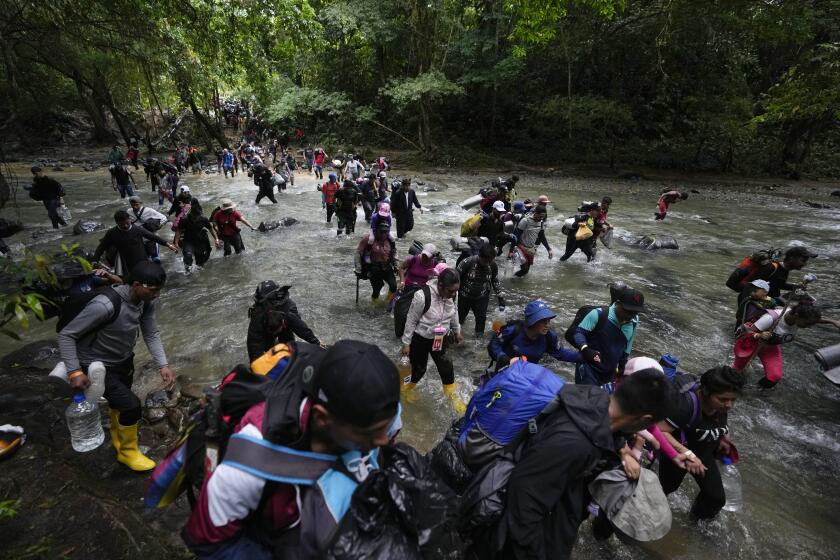Salvadoran Asylum Program May End : Immigration: Clinton Administration is expected to remove special refugee status. But backlog makes it unlikely that any will be deported for at least two years.
The Clinton Administration is expected to announce today that it will end a special refugee program for Salvadoran immigrants, but will use procedures that make it unlikely any would be deported for at least two years--and perhaps far longer, officials said.
Setting aside the protests of Salvadoran officials and some members of Congress, the Administration will formally end the program that shielded 187,000 Salvadorans from deportation because of the long civil war in the Central American nation, a war that has now ended.
The effect on Salvadorans covered by the temporary program, however, is likely to be gradual, according to an Administration official. The refugees will have nine months from Dec. 31 to apply for formal political asylum permitting them to stay in this country permanently. Within that period they will have the right to continue working.
Because of an overwhelming backlog of earlier asylum applications from many countries, the Salvadoran cases are unlikely to be reviewed for at least two years, according to officials. “With our still focusing on current (applications), it will take years to get through that number,” the official said.
The only exceptions are a small number of Salvadorans who have been convicted of aggravated felonies and are not eligible for asylum under any circumstances, according to officials.
An estimated 1 million Salvadoran immigrants live in the United States, about half of whom are legal immigrants. The largest concentration, about 500,000, is in Southern California.
The program’s defenders have argued that money sent home by the Salvadorans--estimated to amount to more than $1 billion annually--is essential to maintain the country’s economic stability and support its fledgling democratic institutions.
In a meeting Thursday with Vice President Al Gore, Salvadoran President Armando Calderon Sol made a last-ditch plea for the program to be extended.
“I will defend the interests of our compatriots and will ask for an extension,” Calderon Sol said as he left San Salvador for Mexico on Wednesday. “What is being sought is a humanitarian solution.”
Calderon Sol remained hopeful before the meeting with Gore in Mexico City, where the two leaders were attending the inauguration of Mexican President Ernesto Zedillo.
Also Thursday, in a letter urging President Clinton to make a third extension of the program, the Congressional Hispanic Caucus argued that its end “will potentially mean an influx of 187,000 Salvadorans into El Salvador,” creating pressures that could be “catastrophic.”
But the State Department says that the improvement of conditions no longer justifies special protections for the Salvadorans. And U.S. officials have argued that it is necessary to ultimately end such temporary asylum programs to assure that there is political support for other special deals when when foreign crises set off other waves of immigration.
When the Salvadoran program was created in 1990, opponents argued that such programs are never actually temporary, but more often lead to permanent citizenship for the covered populations. That was the case with such a program offered to Polish refugees in the 1970s during the Solidarity movement; those immigrants were offered citizenship in a bill sponsored by Sen. Barbara A. Mikulski (D-Md.)
The Salvadoran refugees also were protected under settlement of a 1987 court case alleging that the Immigration and Naturalization Service was unfairly turning down Salvadorans’ asylum applications.
Although the government disputed that charge, it agreed in settling that case that Salvadoran asylum-seekers could remain in the United States during the review of their cases. And it agreed to have the cases reviewed by a new corps of immigration officials specially trained to be sensitive to the Salvadorans’ situation.
Richard Day, an immigration specialist with a Senate judiciary subcommittee on refugees, speculated that many Salvadorans would remain in the United States illegally rather than return to their impoverished land, even if they had not been offered the asylum. “I just don’t think many will go back--they’ve tasted America,” he said.
Times staff writer Tracy Wilkinson contributed to this report from San Salvador.
More to Read
Start your day right
Sign up for Essential California for news, features and recommendations from the L.A. Times and beyond in your inbox six days a week.
You may occasionally receive promotional content from the Los Angeles Times.







